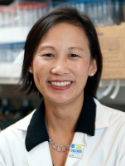HLA-C-dependent prevention of leukemia relapse by donor activating KIR2DS1 Journal Article
| Authors: | Venstrom, J. M.; Pittari, G.; Gooley, T. A.; Chewning, J. H.; Spellman, S.; Haagenson, M.; Gallagher, M. M.; Malkki, M.; Petersdorf, E.; Dupont, B.; Hsu, K. C. |
| Article Title: | HLA-C-dependent prevention of leukemia relapse by donor activating KIR2DS1 |
| Abstract: | BACKGROUND: Of the cancers treated with allogeneic hematopoietic stem-cell transplantation (HSCT), acute myeloid leukemia (AML) is most sensitive to natural killer (NK) - cell reactivity. The activating killer-cell immunoglobulin-like receptor (KIR) 2DS1 has ligand specificity for HLA-C2 antigens and activates NK cells in an HLA-dependent manner. Donor-derived NK reactivity controlled by KIR2DS1 and HLA could have beneficial effects in patients with AML who undergo allogeneic HSCT. METHODS: We assessed clinical data, HLA genotyping results, and donor cell lines or genomic DNA for 1277 patients with AML who had received hematopoietic stem-cell transplants from unrelated donors matched for HLA-A, B, C, DR, and DQ or with a single mismatch. We performed donor KIR genotyping and evaluated the clinical effect of donor KIR genotype and donor and recipient HLA genotypes. RESULTS: Patients with AML who received allografts from donors who were positive for KIR2DS1 had a lower rate of relapse than those with allografts from donors who were negative for KIR2DS1 (26.5% vs. 32.5%; hazard ratio, 0.76; 95% confidence interval [CI], 0.61 to 0.96; P = 0.02). Of allografts from donors with KIR2DS1, those from donors who were homozygous or heterozygous for HLA-C1 antigens could mediate this antileukemic effect, whereas those from donors who were homozygous for HLA-C2 did not provide any advantage (24.9% with homozygosity or heterozygosity for HLA-C1 vs. 37.3% with homozygosity for HLA-C2; hazard ratio, 0.46; 95% CI, 0.28 to 0.75; P = 0.002). Recipients of KIR2DS1-positive allografts mismatched for a single HLA-C locus had a lower relapse rate than recipients of KIR2DS1- negative allografts with a mismatch at the same locus (17.1% vs. 35.6%; hazard ratio, 0.40; 95% CI, 0.20 to 0.78; P = 0.007). KIR3DS1, in positive genetic linkage disequilibrium with KIR2DS1, had no effect on leukemia relapse but was associated with decreased mortality (60.1%, vs. 66.9% without KIR3DS1; hazard ratio, 0.83; 95% CI, 0.71 to 0.96; P = 0.01). CONCLUSIONS: Activating KIR genes from donors were associated with distinct outcomes of allogeneic HSCT for AML. Donor KIR2DS1 appeared to provide protection against relapse in an HLA-C-dependent manner, and donor KIR3DS1 was associated with reduced mortality. (Funded by the National Institutes of Health and others.) Copyright © 2012 Massachusetts Medical Society. All rights reserved. |
| Keywords: | adolescent; adult; child; preschool child; school child; aged; leukemia; retrospective studies; transplantation, homologous; unclassified drug; acute granulocytic leukemia; major clinical study; leukemia, myeloid, acute; recurrence risk; gene; proportional hazards models; genetic association; genotype; recurrence; hematopoietic stem cell transplantation; heterozygote; cancer mortality; acute lymphoblastic leukemia; hla matching; infant; hla dr antigen; hla-c antigens; homozygote; allogeneic hematopoietic stem cell transplantation; killer cells, natural; receptors, kir; hla a antigen; hla b antigen; hla c antigen; leukemia relapse; genomic dna; kaplan-meier estimate; gene linkage disequilibrium; unrelated donors; cancer prognosis; hla dq antigen; hla c1 antigen; hla c2 antigen; kir2ds1 gene; kir3ds1 gene |
| Journal Title: | New England Journal of Medicine |
| Volume: | 367 |
| Issue: | 9 |
| ISSN: | 0028-4793 |
| Publisher: | Massachusetts Medical Society |
| Date Published: | 2012-08-30 |
| Start Page: | 805 |
| End Page: | 816 |
| Language: | English |
| DOI: | 10.1056/NEJMoa1200503 |
| PUBMED: | 22931314 |
| PROVIDER: | scopus |
| PMCID: | PMC3767478 |
| DOI/URL: | |
| Notes: | --- - "Cited By (since 1996): 1" - "Export Date: 1 October 2012" - "CODEN: NEJMA" - "Source: Scopus" |
Altmetric
Citation Impact
BMJ Impact Analytics
Related MSK Work






